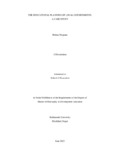
Please use this identifier to cite or link to this item:
https://hdl.handle.net/20.500.14301/471| Title: | The Educational Planning of Local Governments: A Case Study |
| Authors: | Neupane, Bishnu |
| Citation: | Neupane,B.(2023).The educational planning of local governments: A case study. |
| Issue Date: | Jun-2023 |
| Publisher: | Kathmandu University School of Education |
| School: | SOED |
| Department: | Department of Development Studies |
| Level: | M.Phil. |
| Program: | MPhil in Development Studies |
| Abstract: | After the introduction of Constitution of the Government of Nepal in 2015, a full cycle of locally elected representatives completed their tenure assumed for effective service delivery to meet their demands at their doorsteps. The purpose of the study was to explore the process of educational planning at local governments. I used a qualitative research design with an interpretative paradigm. I employed the case study approach in the study. I formed a case from the educational planning process of two local governments of Lumbini province, one from terai area and another from the hills area. The research intended to bring the experiences of local elected representatives' first five years (2017-2022) tenures. Thus I selected two municipalities and took in -depth interviews with the key personnel including the ex mayors, ex-deputy mayors, the planning officers and the education section heads. I took two rounds of interviews with a total of eight personnel and completed the field work according to the tools. Additionally, I made close observations of the ongoing activities of the selected municipalities and also reviewed comprehensively their documents. In this research, I used two theories: participation theory and structuration theory. Participation theory supported me to analyze the level of participation as the study is about the local governments practice and related stakeholders (as defined by the research questions) engagement in educational planning formulated in the local government it is significant to discuss the practice and their engagement which comprises the participation as a prominent principle. And the Structuration theory helped me to analyze the relationship between the planning system of local governments as structure and active agency as senior elected leaders and key responsible staff. Structuration theory was conceptualized by sociologists that offers perspectives on human behavior based on a synthesis of structure and agency effects known as the “duality of structure. The research argues that local level educational planning is unlikely to be meaningful and participatory, and aligned with the ethos of federal decentralization. The study found that the meaningful participation of stakeholders in formulating the process of educational planning that consider much helpful to enhance the quality education practices at local government and promotes quality education meeting the Local needs, and improved transparency, and accountability. Regardless, the educational planning is considered merely at a small unit and not prioritized as a core agenda as a separate entity in the planning process. The stakeholder's capacity and potential to contribute to educational planning seems largely underestimated. Addressing local stakeholder's concerns has been a challenge to the local governments. This study also concludes that the participation theory has been influenced by structuration i.e. ladder of participation has been affected by agency and structure as the position of mayor and marginalized community member's participation also affect the participation level. The findings also suggest that although, the legal provision has forced equal and all representatives' active participation in the entire participatory planning process, still there is a room for improvement to create favorable environment for their effective participation. Equally, the research indicated that, despite better positions in the LISA, there are several gaps in planning provision and practices regarding formulation and implementation of education plans and programs of the researched local governments. To conclude, this study implies that the understanding of the local government personnel regarding educational planning, better partnerships and collaborations among the stakeholders, and their capacity building could positively contribute to improve educational planning culture and its effective implementation. |
| URI: | https://hdl.handle.net/20.500.14301/471 |
| Appears in Collections: | Dissertations |
Files in This Item:
| File | Description | Size | Format | |
|---|---|---|---|---|
| Updated_WCC_Bishnu Neupane_Mphil_Final Revised Thesis_2023.pdf | 776.55 kB | Adobe PDF |  View/Open |
Items in DSpace are protected by copyright, with all rights reserved, unless otherwise indicated.